

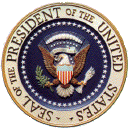

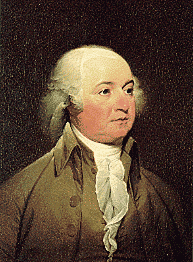
|
Adams was born in the Massachusetts Bay Colony in 1735.A Harvard-educated lawyer, he early became identified with the patriot cause; a delegate to the First and Second Continental Congresses, he led in the movement for independence.During the Revolutionary War he served in France and Holland in diplomatic roles, and helped negotiate the treaty of peace.From 1785 to 1788 he was minister to the Court of St. James's, returning to be elected Vice President under George Washington.
Adams' two terms as Vice President were frustrating experiences for a man of his vigor, intellect, and vanity.He complained to his wife Abigail, "My country has in its wisdom contrived for me the most insignificant office that ever the invention of man contrived or his imagination conceived."
When Adams became President, the war between the French and British was causing great difficulties for the United States on the high seas and intense partisanship among contending factions within the Nation.
His administration focused on France, where the Directory, the ruling group, had refused to receive the American envoy and had suspended commercial relations.Adams sent three commissioners to France, but in the spring of 1798 word arrived that the French Foreign Minister Talleyrand and the Directory had refused to negotiate with them unless they would first pay a substantial bribe. Adams reported the insult to Congress, and the Senate printed the correspondence, in which the Frenchmen were referred to only as "X, Y, and Z."
The Nation broke out into what Jefferson called "the X. Y. Z. fever," increased in intensity by Adams's exhortations.The populace cheered itself hoarse wherever the President appeared. Never had the Federalists been so popular.
Congress appropriated money to complete three new frigates and to build additional ships, and authorized the raising of a provisional army.It also passed the Alien and Sedition Acts, intended to frighten foreign agents out of the country and to stifle the attacks of Republican editors.
President Adams did not call for a declaration of war, but hostilities began at sea.
At first, American shipping was almost defenseless against French privateers, but by 1800 armed merchantmen and U.S. warships were clearing the sea-lanes.Despite several
brilliant naval victories, war fever subsided.
Word came to Adams that France also had no stomach for war and would receive an envoy with respect.Long negotiations ended the quasi war. Sending a peace mission to France brought the full fury of the Hamiltonians against Adams.
In the campaign of 1800 the Republicans were united and effective, the Federalists badly divided.Nevertheless, Adams polled only a few less electoral votes than Jefferson, who became President. On November 1, 1800, just before the election, Adams arrived in the new Capital City to take up his residence in the White House.On his second evening in its damp, unfinished rooms, he wrote his wife, "Before I end my letter, I pray Heaven to bestow the best of Blessings on this House and all that shall hereafter inhabit it. May none but honest and wise Men ever rule under this roof."Adams retired to his farm in Quincy. Here he penned his elaborate letters to Thomas Jefferson.Here on July 4, 1826, he whispered his last words: "Thomas Jefferson survives." But Jefferson had died at Monticello a few hours earlier.

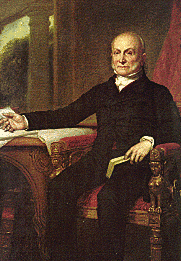
|
After graduating from Harvard College, he became a lawyer. At age 26 he was appointed Minister to the Netherlands, then promoted to the Berlin Legation. In 1802 he was elected to the United States Senate. Six years later President Madison appointed him Minister to Russia.
Serving under President Monroe, Adams was one of America's great Secretaries of State, arranging with England for the joint occupation of the Oregon country, obtaining from Spain the cession of the Floridas, and formulating with the President the Monroe Doctrine.
In the political tradition of the early 19th century, Adams as Secretary of State was considered the political heir to the Presidency. But the old ways of choosing a President were giving way in 1824 before the clamor for a popular choice.
Within the one and only party--the Republican--sectionalism and factionalism were developing, and each section put up its own candidate for the Presidency. Adams, the candidate of the North, fell behind Gen. Andrew Jackson in both popular and electoral votes, but received more than William H. Crawford and Henry Clay. Since no candidate had a majority of electoral votes, the election was decided among the top three by the House of Representatives. Clay, who favored a program similar to that of Adams, threw his crucial support in the House to the New Englander.
Upon becoming President, Adams appointed Clay as Secretary of State. Jackson and his angry followers charged that a "corrupt bargain" had taken place and immediately began their campaign to wrest the Presidency from Adams in 1828.
Well aware that he would face hostility in Congress, Adams nevertheless proclaimed in his first Annual Message a spectacular national program. He proposed that the Federal Government bring the sections together with a network of highways and canals, and that it develop and conserve the public domain, using funds from the sale of public lands. In 1828, he broke ground for the 185-mile C & 0 Canal. Adams also urged the United States to take a lead in the development of the arts and sciences through the establishment of a national university, the financing of scientific expeditions, and the erection of an observatory. His critics declared such measures transcended constitutional limitations.
The campaign of 1828, in which his Jacksonian opponents charged him with corruption and public plunder, was an ordeal Adams did not easily bear. After his defeat he returned to Massachusetts, expecting to spend the remainder of his life enjoying his farm and his books.
Unexpectedly, in 1830, the Plymouth district elected him to the House of Representatives, and there for the remainder of his life he served as a powerful leader. Above all, he fought against circumscription of civil liberties.
In 1836 southern Congressmen passed a "gag rule" providing that the House automatically table petitions against slavery. Adams tirelessly fought the rule for eight years until finally he obtained its repeal. In 1848, he collapsed on the floor of the House from a stroke and was carried to the Speaker's Room, where two days later he died. He was buried--as were his father, mother, and wife--at First Parish Church in Quincy. To the end, "Old Man Eloquent" had fought for what he considered right.

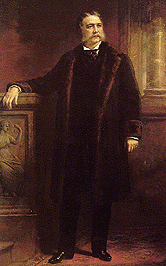
|
The son of a Baptist preacher who had emigrated from northern Ireland, Arthur was born in Fairfield, Vermont, in 1829. He was graduated from Union College in 1848, taught school, was admitted to the bar, and practiced law in New York City. Early in the Civil War he served as Quartermaster General of the State of New York.
President Grant in 1871 appointed him Collector of the Port of New York. Arthur effectively marshalled the thousand Customs House employees under his supervision on behalf of Roscoe Conkling's StalwartRepublican machine.
Honorable in his personal life and his public career, Arthur nevertheless was a firm believer in the spoils system when it was coming under vehement attack from reformers. He insisted upon honest administration of the Customs House, but staffed it with more employees than it needed, retaining them for their merit as party workers rather than as Government officials.
In 1878 President Hayes, attempting to reform the Customs House, ousted Arthur. Conkling and his followers tried to win redress by fighting for the renomination of Grant at the 1880 Republican Convention. Failing, they reluctantly accepted the nomination of Arthur for the Vice Presidency.
During his brief tenure as Vice President, Arthur stood firmly beside Conkling in his patronage struggle against President Garfield. But when Arthur succeeded to the Presidency, he was eager to prove himself above machine politics.
Avoiding old political friends, he became a man of fashion in his garb and associates, and often was seen with the elite of Washington, New York, and Newport. To the indignation of the Stalwart Republicans, the onetime Collector of the Port of New York became, as President, a champion of civil service reform. Public pressure, heightened by the assassination of Garfield, forced an unwieldy Congress to heed the President. In 1883 Congress passed the Pendleton Act, which established a bipartisan Civil Service Commission, forbade levying political assessments against officeholders, and provided for a "classified system" that made certain Government positions obtainable only through competitive written examinations. The system protected employees against removal for political reasons.
Acting independently of party dogma, Arthur also tried to lower tariff rates so the Government would not be embarrassed by annual surpluses of revenue. Congress raised about as many rates as it trimmed, but Arthur signed the Tariff Act of 1883. Aggrieved Westerners and Southerners looked to the Democratic Party for redress, and the tariff began to emerge as a major political issue between the two parties.
The Arthur Administration enacted the first general Federal immigration law. Arthur approved a measure in 1882 excluding paupers, criminals, and lunatics. Congress suspended Chinese immigration for ten years, later making the restriction permanent.
Arthur demonstrated as President that he was above factions within the Republican Party, if indeed not above the party itself. Perhaps in part his reason was the well-kept secret he had known since a year after he succeeded to the Presidency, that he was suffering from a fatal kidney disease. He kept himself in the running for the Presidential nomination in 1884 in order not to appear that he feared defeat, but was not renominated, and died in 1886. Publisher Alexander K. McClure recalled, "No man ever entered the Presidency so profoundly and widely distrusted, and no one ever retired ... more generally respected."

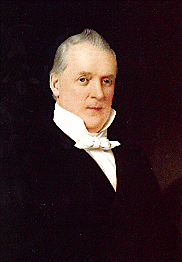
|
Born into a well-to-do Pennsylvania family in 1791, Buchanan, a graduate of Dickinson College, was gifted as a debater and learned in the law.
He was elected five times to the House of Representatives; then, after an interlude as Minister to Russia, served for a decade in the Senate. He became Polk's Secretary of State and Pierce's Minister to Great Britain. Service abroad helped to bring him the Democratic nomination in 1856 because it had exempted him from involvement in bitter domestic controversies.
As President-elect, Buchanan thought the crisis would disappear if he maintained a sectional balance in his appointments and could persuade the people to accept constitutional law as the Supreme Court interpreted it. The Court was considering the legality of restricting slavery in the territories, and two justices hinted to Buchanan what the decision would be. Thus, in his Inaugural the President referred to the territorial question as "happily, a matter of but little practical importance" since the Supreme Court was about to settle it "speedily and finally."
Two days later Chief Justice Roger B. Taney delivered the Dred Scott decision, asserting that Congress had no constitutional power to deprive persons of their property rights in slaves in the territories. Southerners were delighted, but the decision created a furor in the North.
Buchanan decided to end the troubles in Kansas by urging the admission of the territory as a slave state. Although he directed his Presidential authority to this goal, he further angered the Republicans and alienated members of his own party. Kansas remained a territory.
When Republicans won a plurality in the House in 1858, every significant bill they passed fell before southern votes in the Senate or a Presidential veto. The Federal Government reached a stalemate.
Sectional strife rose to such a pitch in 1860 that the Democratic Party split into northern and southern wings, each nominating its own candidate for the Presidency. Consequently, when the Republicans nominated Abraham Lincoln, it was a foregone conclusion that he would be elected even though his name appeared on no southern ballot. Rather than accept a Republican administration, the southern "fire-eaters" advocated secession.
President Buchanan, dismayed and hesitant, denied the legal right of states to secede but held that the Federal Government legally could not prevent them. He hoped for compromise, but secessionist leaders did not want compromise. Then Buchanan took a more militant tack. As several Cabinet members resigned, he appointed northerners, and sent the Star of the West to carry reinforcements to Fort Sumter. On January 9, 1861, the vessel was far away. Buchanan reverted to a policy of inactivity that continued until he left office. In March 1861 he retired to his Pennsylvania home Wheatland--where he died seven years later--leaving his successor to resolve the frightful issue facing the Nation.

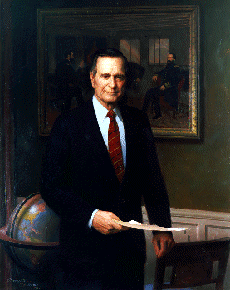
|
Born in Milton, Massachusetts, on June 12, 1924, he became a student leader at Phillips Academy in Andover. On his 18th birthday he enlisted in the armed forces. The youngest pilot in the Navy when he received his wings, he flew 58 combat missions during World War II. On one mission over the Pacific as a torpedo bomber pilot he was shot down by Japanese antiaircraft fire and was rescued from the water by a U. S. submarine. He was awarded the Distinguished Flying Cross for bravery in action.
Bush next turned his energies toward completing his education and raising a family. In January 1945 he married Barbara Pierce. They had six children-- George, Robin (who died as a child), John (known as Jeb), Neil, Marvin, and Dorothy.
At Yale University he excelled both in sports and in his studies; he was captain of the baseball team and a member of Phi Beta Kappa. After graduation Bush embarked on a career in the oil industry of West Texas.
Like his father, Prescott Bush, who was elected a Senator from Connecticut in 1952, George became interested in public service and politics. He served two terms as a Representative to Congress from Texas. Twice he ran unsuccessfully for the Senate. Then he was appointed to a series of high-level positions: Ambassador to the United Nations, Chairman of the Republican National Committee, Chief of the U. S. Liaison Office in the People's Republic of China, and Director of the Central Intelligence Agency.
In 1980 Bush campaigned for the Republican nomination for President. He lost, but was chosen as a running mate by Ronald Reagan. As Vice President, Bush had responsibility in several domestic areas, including Federal deregulation and anti-drug programs, and visited scores of foreign countries. In 1988 Bush won the Republican nomination for President and, with Senator Dan Quayle of Indiana as his running mate, he defeated Massachusetts Governor Michael Dukakis in the general election.
Bush faced a dramatically changing world, as the Cold War ended after 40 bitter years, the Communist empire broke up, and the Berlin Wall fell. The Soviet Union ceased to exist; and reformist President Mikhail Gorbachev, whom Bush had supported, resigned. While Bush hailed the march of democracy, he insisted on restraint in U. S. policy toward the group of new nations.
In other areas of foreign policy, President Bush sent American troops into Panama to overthrow the corrupt regime of General Manuel Noriega, who was threatening the security of the canal and the Americans living there. Noriega was brought to the United States for trial as a drug trafficker. Bush's greatest test came when Iraqi President
Saddam Hussein invaded Kuwait, then threatened to move into Saudi Arabia. Vowing to free Kuwait, Bush rallied the United Nations, the U. S. people, and Congress and sent 425,000 American troops. They were joined by 118,000 troops from allied nations. After weeks of air and missile bombardment, the 100-hour land battle dubbed Desert Storm routed Iraq's million-man army.
Despite unprecedented popularity from this military and diplomatic triumph, Bush was unable to withstand discontent at home from a faltering economy, rising violence in inner cities, and continued high deficit spending. In 1992 he lost his bid for reelection to Democrat William Clinton.

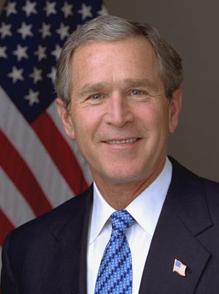
|
President Bush was born on July 6, 1946, in New Haven, Connecticut, and grew up in Midland and Houston, Texas. He received a bachelor's degree in history from Yale University in 1968, and then served as an F-102 fighter pilot in the Texas Air National Guard. President Bush received a Master of Business Administration from Harvard Business School in 1975. Following graduation, he moved back to Midland and began a career in the energy business. After working on his father's successful 1988 Presidential campaign, President Bush assembled the group of partners who purchased the Texas Rangers baseball franchise in 1989. On November 8, 1994, President Bush was elected Governor of Texas.
He became the first Governor in Texas history to be elected to consecutive 4-year terms when he was re-elected on November 3, 1998. Since becoming President of the United States in 2001, President Bush has worked with the Congress to create an ownership society and build a future of security, prosperity, and opportunity for all Americans. He signed into law tax relief that helps workers keep more of their hard-earned money, as well as the most comprehensive education reforms in a generation, the No Child Left Behind Act of 2001. This legislation is ushering in a new era of accountability, flexibility, local control, and more choices for parents, affirming our Nation's fundamental belief in the promise of every child. President Bush has also worked to improve healthcare and modernize Medicare, providing the first-ever prescription drug benefit for seniors; increase homeownership, especially among minorities; conserve our environment; and increase military strength, pay, and benefits. Because President Bush believes the strength of America lies in the hearts and souls of our citizens, he has supported programs that encourage individuals to help their neighbors in need.
On the morning of September 11, 2001, terrorists attacked our Nation. Since then, President Bush has taken unprecedented steps to protect our homeland and create a world free from terror. He is grateful for the service and sacrifice of our brave men and women in uniform and their families. The President is confident that by helping build free and prosperous societies, our Nation and our friends and allies will succeed in making America more secure and the world more peaceful.
President Bush is married to Laura Welch Bush, a former teacher and librarian, and they have twin daughters, Barbara and Jenna. The Bush family also includes two dogs, Barney and Miss Beazley, and a cat, Willie.
